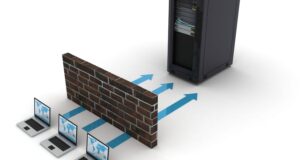Table of Contents
Network firewalls protect computers from viruses, malware, spyware and other dangerous software. They also protect your company’s internal network resources from illegal access.
Businesses require a network firewall to prevent hackers from gaining access to sensitive data and interrupting operations – or demanding ransom in exchange for the data (also known as a ransomware attack). A firewall may also help you monitor your personnel and ensure they comply with your company’s policies.
What Is a Firewall?
A firewall is one approach to keeping out unauthorized users and hackers. Firewalls prevent attackers from entering your computer by preventing them from entering in the first place. Antivirus software safeguards data against viruses; it should be installed on every machine in the network.
The importance of network firewall security for modern enterprises is based on the following factors:
A Firewall Prevents Hackers From Infiltrating Your Company
Social engineering is hackers’ most popular method to gain access to company systems and data. These criminals utilize various techniques to get private and personal information from individuals.
Firewalls can alert you to the arrival of harmful traffic and prevent assaults. You may get a standalone firewall, or hardware and software that performs both functions. Nevertheless, it is preferable to get a firewall with antivirus protection.
Block Access to Unapproved Websites With a Firewall
Firewalls prevent unauthorized individuals from gaining access to your network. However, you may also prevent your employees from visiting certain websites. This is beneficial if you do not want your staff to visit unsuitable websites or to download viruses while working on your network.
You can prohibit your staff from accessing pornographic and gambling websites. Insecure online shopping sites and unlawful downloads may also be prevented from your computer; you can also achieve this.
Control what your workers view while using their computers at work, and protect your network from sites which may contain harmful malware. Using a firewall, you may accomplish both of these objectives.
Protect Your Company from Hackers and Malicious Code
 People use firewalls to protect their computers from viruses and other malicious software. Firewalls monitor all incoming and outgoing data and report any abnormal behaviour. There are methods to configure them to alert you when your computer is under attack, or when an unauthorized user attempts to access it. There are several ways these notifications might improve your organization’s security.
People use firewalls to protect their computers from viruses and other malicious software. Firewalls monitor all incoming and outgoing data and report any abnormal behaviour. There are methods to configure them to alert you when your computer is under attack, or when an unauthorized user attempts to access it. There are several ways these notifications might improve your organization’s security.
Your firm will be on its radar if a threat actor sends you several notifications. This may indicate that you need to strengthen your defenses further. Start developing a robust cyber incident response strategy immediately in case you are compromised.
Bandwidth Usage Can Be Modified for Certain Programs
Some firewalls are capable of regulating network bandwidth. A firewall can be used to restrict the bandwidth available for specific data types such as emails. This is possible if you restrict the bandwidth to broadcast video and other media files.
It is possible to configure a firewall to allow certain kinds of internet traffic. Suppose you wish to restrict access to some websites, yet allow access to your business printer.
VPN Services May Be Offered Via Firewall
A virtual private network (VPN) uses encryption technologies to prevent two individuals from communicating. The encrypted data cannot be seen nor heard while it travels through public networks such as the internet.
For instance, you may configure your firewall so that only specific machines can connect to the internet. Then, you may construct a tunnel that will allow these machines to communicate securely over the Internet.
When you want to keep your company data secure while it is transferred to your home office, you may utilize a firewall. This may also be used to link your firm’s local area network (LAN) to a wide area network (WAN).
A Firewall Is an Essential Component of a Comprehensive Cybersecurity Plan
Firewalls are only one component of a comprehensive cybersecurity plan. Providers of Managed Firewall Services can help with the development and implementation of a custom cybersecurity plan. They may advise you on how to defend your networks, identify issues with your systems, monitor them and report on their status.
In conclusion, it is essential to understand how firewalls function so you can use them to safeguard your organization. Contact CyberHunter at (833) 292-4832 or visit us online for more information.


